#semi-fascism
Photo
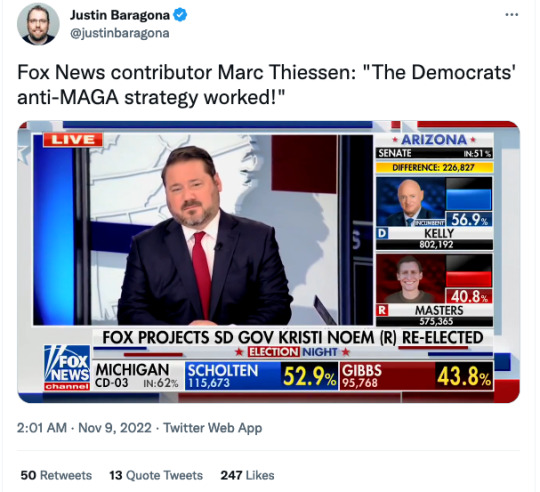
From Justin Baragona on Twitter.
Fox News just can’t understand why so many people find MAGA semi-fascism repulsive and un-American.
It’s not just that Democrats had an anti-MAGA message; it wouldn’t have worked if it didn’t genuinely resonate with the American people.
#fox news#maga#semi-fascism#donald trump#un-american#election 2022#midterm elections#gop stumble#justin baragona
2 notes
·
View notes
Text
Truth Doesn't Require An Apology
Truth Doesn’t Require An Apology
I fully support civil discourse, compassion, tolerance, kindness, etc., but there comes a time when it is necessary to call a spade a spade. President Biden did just that earlier this week … he called the far-right Republican movement a ‘threat to democracy’ and ‘semi-fascist’. Those who are angered by his words should take a long, hard look at what their hopes for the future of this nation are…
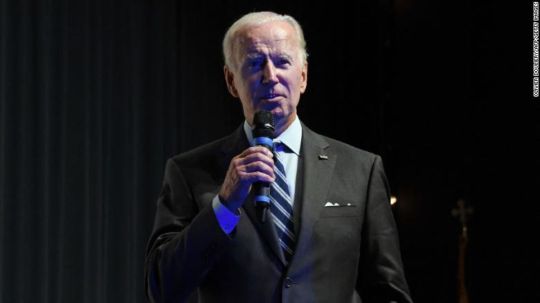
View On WordPress
#Charles M. Blow#maga-cult#New York Times#President Joe Biden#Quinnipiac poll#semi-fascism#the former guy
0 notes
Text
The danger of creating an educated proletariat!
The danger of creating an educated proletariat!
In the early 1980’s I taught in a Secondary school in Missouri, USA.
It was already happening. The dumbing down of education and therefore the dumbing down of the USA.
It actually began as a political focus in the late 1976’s when Reagan was Governor of California.
As Governor of California he had shown concern for the supposed radicals at the University of California Berkeley Campus.
Tuition…

View On WordPress
0 notes
Text

So I was reading Van Loon's Lives (a rather interesting book from the 1940s in which a fictionalized version of the author invites various long-dead historical figures to dinner), and somehow this line from the Theodora & Queen Elizabeth I dinner party got me. I like the idea of someone inventing a potato. Like, I just imagine some chemist in a lab somewhere playing with beakers and test tubes, and then some Erlenmeyer flask explodes in a cloud of sparkles to reveal a single potato.
#it's an interesting book (it was written in the early 40s and set in the early 30s#so there are a lot of allusions to then-contemporary events like the rise of fascism in Europe#parts of it are semi-autobiographical#and the dinner parties themselves are pretty short; most of the book consists of historical essays#presented as information Van Loon gives to his friend to prepare him for dinner)#as far as Byzantium goes it's a fairly cute (and thankfully normal and balanced) portrayal of Theodora#although I will complain that the female historical figures are not as well-written as the men (but it's the 40s#so)#anyway it's free on archive.org if you want to check it out
2 notes
·
View notes
Text
honestly petition to replace the entire current brf w Sir Lewis and Harry and Meghan
#I mean no bc of the rise of fascism in the uk currently but#if it wouldn’t put them in mortal danger then imagine how great that would be#instead of crowning morally bankrupt semi corpses all that pomp and ceremony on beautiful ppl who are also good#behind cut bc brf stans are evil
0 notes
Photo
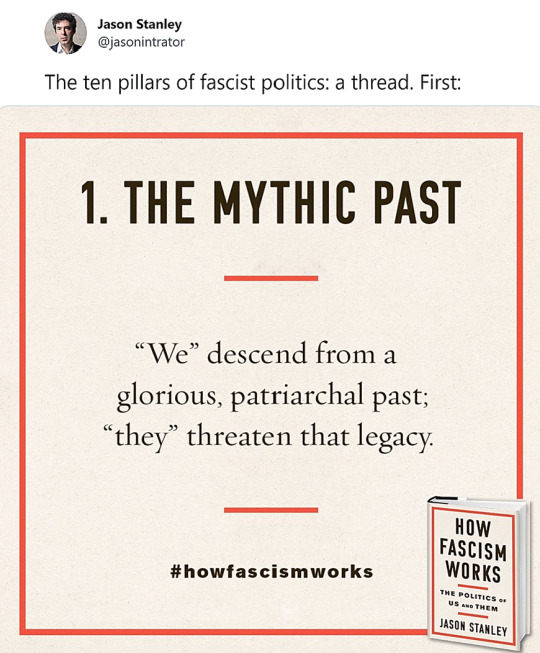
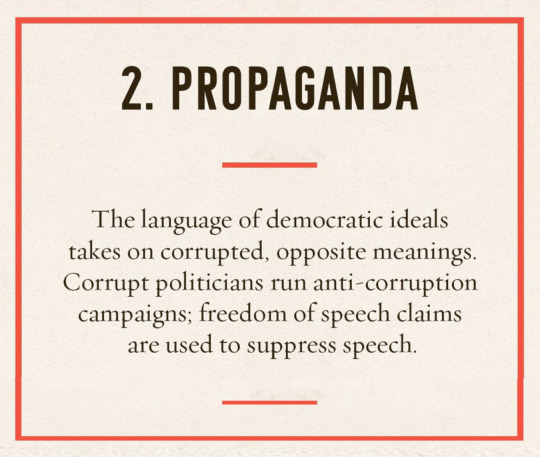

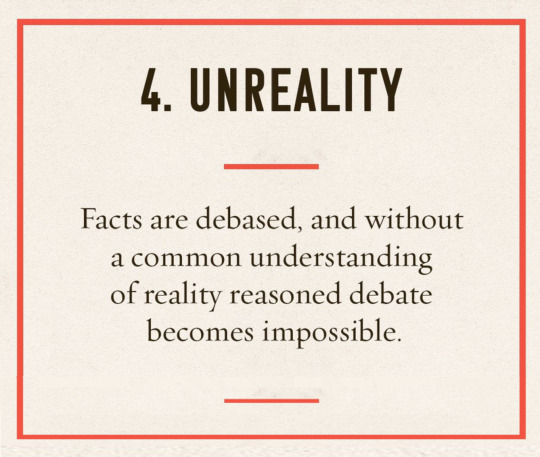
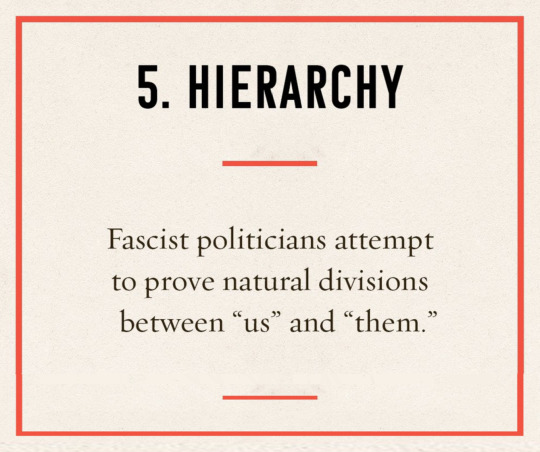
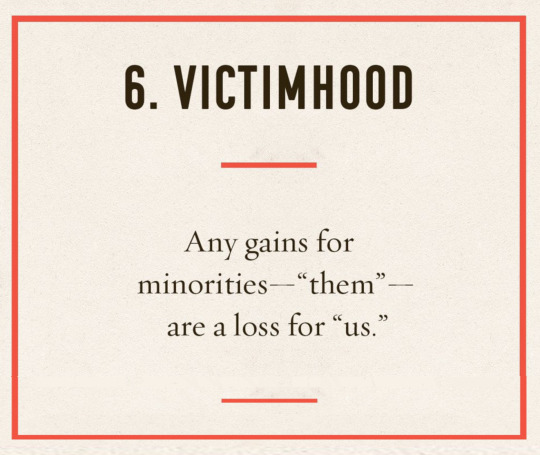
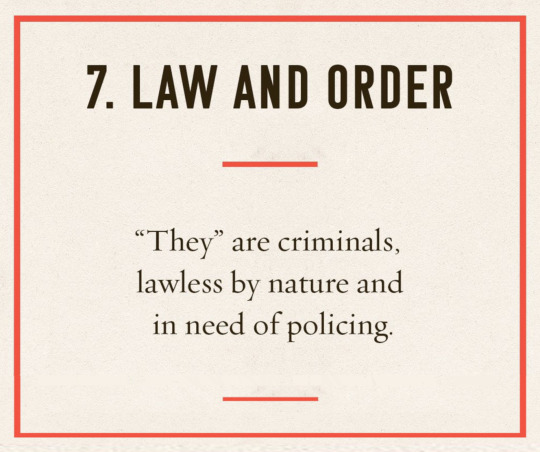



The Ten Pillars of Fascist Politics by Jason Stanley
Above is a July 6, 2021 twitter thread by Yale philosophy professor Jason Stanley, PhD, which outlines the 10 pillars of fascist politics. It shows just how fascist most of the Republican Party has become under Trump’s leadership. The current MAGA GQP has incorporated each of the above 10 pillars into its talking points and philosophy.
This is why the GQP has been up in arms about Biden accurately calling their Trumpist political ideology “semi-fascism.”
Feel free to share this with your relatives and friends who want to defend the direction the GQP has been going in. [Just be prepared when they counterattack to explain why the Democratic Party is not “communist” or “socialist,” but a center left political party, with its most extreme members being social democrats (even Bernie Sanders and AOC aren’t really democratic socialists)].
[edited]
_______________________
Note: The visual formatting of how the original tweet in the thread appears, as well as the visual formatting of pillars number 2 - 9 were modified from their source; furthermore, the translation of “ARBEIT MACH FREI” AS “WORK MAKES ONE FREE” was added to pillar #10.
#the ten pillars of fascist politics#jason stanley#how fascism works#us politics#republicans#gop#gqp#trump#maga republicans#fascism#my edits
9K notes
·
View notes
Text
AUUC('s Edmonton Branch) released a statement on the Volunteer Nazi given a standing ovation in Canadian Parliament, read it

[x]
transcription after the cut
The Edmonton Branch of the Association of United Ukrainian Canadians (AUUC) condemns the honoring of a nazi Ukrainian World War II veteran, a member of the notorious 14th Waffen SS Division "Halychyna", in the House of Commons during the visit of Ukrainian President Zelenskiy last Friday, 22 September, 2023.
Our Association, founded in 1918 in Winnipeg as the Ukrainian Labor Temple Association, has an unblemished record of opposing fascism, in word and deed, before and after WWII, in Canada, in the Ukrainian-Canadian community, and abroad. Our members fought heroically in the Spanish Civil War, on the side of the Republican government, against fascism. They fought for Canada, allied with the Soviet Union, against nazi Germany and fascist Italy in WWII.
It is therefore unbelievable to us, as to most other Canadians, that when the individual in question, Yaroslav Hunka, was introduced in parliament as a Ukrainian veteran of WWII who fought against Russia, no one in attendance, all of whom gave him two standing ovations, realized what this meant. We know exactly what it meant.
Now this shameful spectacle has been publicized to all Canadians, and throughout the world. We welcome this publicization. We hope it will lead to a reckoning. Some steps in this direction have already been taken. The speaker of the House of Commons has resigned. An endowment in the name of Yaroslav Hunka at the Canadian Institute of Ukrainian Studies, at the University of Alberta, has been returned. We welcome these steps. But they are only first steps. Much more must be done. The problem is greater than simply one nazi, one speaker, and one endowment.
It is estimated that two thousand members of the 14th Waffen SS Division "Halychyna" were allowed into Canada after WWII. Our Association, immediately at that time, publicized and opposed their entry, to our everlasting credit. This figure does not include other nazis and nazi-collaborators, of various nationalities. That means thousands of Yaroslav Hunkas. Several of them went on to occupy prominent and leading positions in certain other Ukrainian-Canadian organizations, in religious institutions, educational institutions, and state institutions. The Canadian state supports, with funding and semi-official recognition, Ukrainian-Canadian organizations that unapologetically honor these nazis. If honoring Yaroslav Hunka in the House of Commons was a shameful act that had to be corrected, then so must all these other cases be corrected.
We therefore call on the Canadian state at all three levels (federal, provincial, municipal) to halt all state funding to all Ukrainian-Canadian organizations which honor any Ukrainian nazis or nazi-collaborators, including especially veterans of the 14th Waffen SS Division "Halychyna", until such time as these organizations explicitly and unequivocally apologize for having done so, severing all connections with all these nazis and nazi-collaborators, in all forms whatsoever.
We call for the removal and dismantling of two monuments to nazi Ukrainians in Edmonton: the monument to the veterans of the 14th Waffen SS Division "Halychyna" located in St. Michael's Cemetery, and the bust of Roman Shukhevych located at the Ukrainian Youth Unity Complex, preferably by their respective property owners, and if not by them, then by state compulsion.
We call on the government of Canada, and on the Liberal Party of Canada which formed the government at the time, to issue official apologies to our Association (the AUUC), in consultation with our Association, for banning it (then named the Ukrainian Labor-Farmer Temple Association) by an order in council in June 1940, seizing its properties, our halls and their contents (furniture, musical instruments, dance costumes, books, etc., most of which were destroyed), and interning our leaders in internment camps, acknowledging this as a terrible miscarriage of justice and act of oppression.
We call on all Canadians, all progressive Canadians, all decent Canadians, all anti-fascist Canadians, individually and through their various organizations, to support us in these calls for justice, by publicizing this statement, and pressuring their political representatives.
310 notes
·
View notes
Link
Blake Masters is the Trump Republican candidate for US Senate from Arizona.
Masters is so racist that if he campaigned in KKK robes, people would regard his costume as redundant.
You may know Blake Masters, the Republican candidate for Senate in Arizona, as one of the guys who got $10 million from anti-Democratic billionaire Peter Thiel or as the candidate endorsed by a prominent Nazi. But over the past few months, Thiel’s ex-stenographer has been trying to jolt his way into the minds of the electorate by stripping away the subtext of common Republican talking points and getting directly to racist ideas, from blasting the first Black vice-president as an unqualified “affirmative action” hire to blaming “Black people” (yes, really) for most gun violence in the U.S. It’s worth a closer look at his rhetoric, given the possibility he could beat Democratic incumbent Mark Kelly in November.
Masters is a disciple of semi-fascist Peter Thiel. He was enthusiastically endorsed by Donald Trump in the Arizona primary. But it only gets worse from there.
Masters thinks that minorities and people of color are innately inferior.
Labeling Black candidates with ambitious CVs as unqualified, from Barack Obama to Ketanji Brown Jackson, is a time-honored tradition by politicians like Masters. As for Harris, she was elected cumulatively by tens of millions of people as San Francisco district attorney, California attorney general, and U.S. senator before she was also elected as vice-president.
Justice Ketanji Brown Jackson has more brains in her toenail than Masters has in his empty skull.
Of course Masters joins Tucker Carlson and other racists in pushing so-called “replacement theory”.
In so many words, the idea Masters is suggesting is the replacement theory, a tenet of white nationalism cited by racist mass shooters across the country, most recently in Buffalo. In a statement to the New York Times, Masters doubled down, saying, “It is obvious to everyone that Democrats see illegal immigrants as future voters. No ‘theory’ is needed to observe that.”
While the concept moved from the fringe to the mainstream of the party during the Trump administration, it’s an interesting policy for Masters to adopt, given that more than a third of Arizona is Latino and that he is also trying to court socially conservative Latino voters moving away from the Democratic Party.
Masters bizarrely doesn’t care if his idiocy alienates over a third of Arizona’s voters.
But wait, there’s more! Blake Masters has a long history of radical anti-abortion positions — which he doesn’t want Arizona voters to know about.
Masters is trying to keep Arizona voters from knowing that he is an anti-abortion extremist. He has been hilariously deleting his previously stated hardline anti-abortion views from his site.
Blake Masters scrubbed his website again. Is anybody buying his sudden makeover?
This creative editing only draws attention to his long term stance of wanting to regulate the nation’s vaginas.
Politifact has judged the contention that Masters favors a nationwide abortion ban as “Mostly True”.
Blake Masters “wants to pass a national ban on abortion”
We cannot trust Trump Republicans on abortion. All three of Trump’s appointees to the US Supreme Court testified in Senate confirmation hearings that they regarded Roe v. Wade as “established law”. SPOILER ALERT: They lied at the hearings. They all enthusiastically supported the far right’s abolition of a national right to abortion as soon as they had a chance on the court.
There’s no reason to believe that Blake Masters’s editing of his site means that he has changed his fanatical anti-abortion positions at all. It’s just more of the same old Trump Republican bullshit.
#blake masters#arizona#peter thiel#us senate#trump republicans#racism#semi-fascism#abortion#the sanctity of reproductive freedom#politifact#midterm elections#election 2022
2 notes
·
View notes
Note
comrade hazel! ive had some people in my branch reccomend I read trotsky but I'm reading him and I think both theoretically and practically he doesnt hold up. and he's petty. am I missing something?
Petty would be a great way to describe trotsky's later work. But, that's not to say the man is entirely ideologically bankrupt. A good example of this is his essay on fascism, which is a concise quick read with a Marxist analysis on the origins of fascism while it seized power across europe. trotsky was also a prudent military leader during the revolution and civil war and here his theories and practical work can also be studied.
However, trotsky's main thesis, that is, permanent revolution is flawed and doesn't hold much water, especially today. The primary problem with permanent revolution is its dogmatism and undialetical materialism. Socialism in one country arose as a necessary though non-ideal solution to the need for both development and the lack of proper productive forces to continue waging international revolution. The success of the socialist state in the Soviet Union is very much proof that you can and must have socialism in one country before you can properly "export revolution". Continuity of the revolution, another central tenant of permanent revolution, might make more sense in a semi-feudal society like tsarist russia, but makes little sense in developed bourgeois nations like the united states.
Trotsky, as a former menshevik, also has a "middle-ground" type ideological grounds which separated him from bolsheviks such as his distrust of the peasantry. Trotsky's work is very much of his time and (attempt to) address the concerns and problems existing from the messy period between the October Revolution and the construction of the Soviet state. Indeed, both Lenin and Stalin thoroughly criticized Trotsky's theoretical work on application to their conditions (you don't get the "p.s. trotsky sent in a silly letter" quip from nothing).
Trotsky and trotskyists today don't play a large role in political-economy (funnily enough, trotsky, due to his proximity and time spent in Latin America after exile, influenced many Latin Americans socialists). In the united states, trotskyism essentially fizzled out after the dissolution of the USSR. The reason is simple: trotskyism was a left-wing deviation to attack the the USSR on, just as maoism/maoists (im specifically not referring to MZT, but things like the former "austin red guards") are used as a left-wing attack on the PRC.
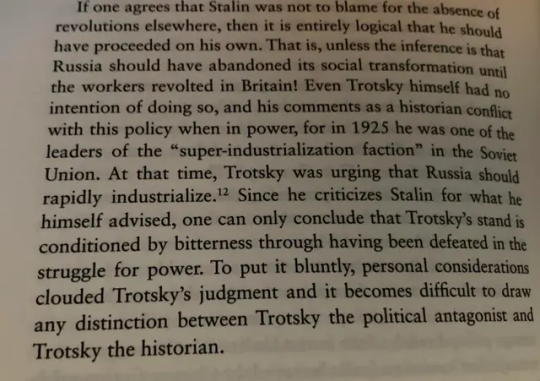
Walter Rodney, The Russian Revolution: A View From The Third World
86 notes
·
View notes
Text
Better Bones: CW List
Can't believe I have to make this disclaimer, but here we are
Better Bones is not a project that aims to fix canon by making the Clans wholesome and unproblematic. Though there can be fun and kindness in it and my philosophy is an optimistic one, It's not an escapist fantasy. It is a story about semi-realistic cats of human intelligence in a violent, war-obsessed theocratic dictatorship, and how they attempt to change it over the years.
Clan Culture is flawed, that is on purpose. Addressing and changing this is what the story is about.
I am very disappointed I have to state this because it should be obvious from my main post where I explicitly say that my goal is to "Address (Canon's) Problematic Elements." Not remove.
If you cannot handle themes or depictions of;
Physical and emotional abuse; Domestic, authoritative, and familial
Child abuse and inter-generational trauma
Somewhat graphic medical discussion, such as abortion, wound infection, and the use of leeches and maggots
The killing and processing of small animals into food, including tanning and butchery
Semi-realistic cat behaviors, specifically marking things with urine
Ableism; both externalized and internalized, Clan culture treats disabled cats poorly and this is something several characters struggle with
Xenophobia; to a violent degree, including stochastic terrorism, hate crime, and discrimination
^^^ read that one again. Consider that on this list twice.
Politics; Authoritarianism, fascism, and liberalism as an enemy, discussion of dog whistles and ideology
"Redemption arcs" of people who did bad things
Cosmic horror and supernatural curses
Graphic violence, including against innocent bystanders, through assault, poisoning, drowning, falling, and even being eaten alive by large fish and demigods.
Animal abuse; Human beings harming cats on purpose and Clan cats generally being terrified of all humans, even kind and loving ones
Clan cats, both villainous and culturally mislead, glorifying these things in-universe, not immediately staring at the camera and breaking character to tell you "This Is A Bad Thing!"
Then Better Bones may not be for you. I would at minimum rate this project as PG-13, but PG-16 would be a more accurate bet.
I have sympathy for you if these are not topics you can handle. My project tackles very upsetting real-world issues and not everyone is looking for something challenging; that's understandable and there's no fault in that. I try to tag appropriately but can't promise to catch everything, so please keep yourself safe.
There are other, softer projects out there run by cool people if this is not for you, and you can add #Better Bones AU to your tag filters and this project will not show up!
But, I'm not responsible for your comfort with my art. If you followed me under the assumption that BB is "Warriors without any ableism/xenophobia/violence" you were mistaken. If you don't have the maturity to act responsibly when something upsets you, or DO have the malice to read a disabled person's work with the most bad faith interpretations you can muster, LEAVE.
#It's better bones not Brand New Bones#better bones au#cw list#masterpost#I'm dead serious get the fuck out. I don't want people like that here#I'm not writing this for the people who couldn't handle steven fucking universe#This is NOT a feelgood happy story with distant lackadaisical problems#A guy gets gutted on-screen and then they sing a song about how cathartic his gruesome death was#Because they all watched him equally gruesomely kill a bunch of innocent people including kids#Bumbs was going to get MURDERED before ThunderStorm bowled in#Really can't believe I'm saying this but guys there are some fucking People out there#Hi! I'm a random weirdo who doesn't follow you type shit#Clans are XENOPHOBIC.#THEY TREAT FOREIGNERS BAD#There is going to be a WHOLE THING about Berry the Evil Educator and how she uses 'proper grammar' to shame and demonize Heart's guardians#christ
216 notes
·
View notes
Text
[epistemic status: a bunch of semi-related thoughts I am trying to work out aloud] It has been noted countless times that reactionary politics rely on a feeling of threat: our enemies are strong and we are weak (but we are virtuous and they are not, which is why they’re our enemies!); we must defend ourselves, we must not be afraid of doing what needs to be done; we must not shie away from power generally, and violence specifically.
And there are lots of contexts--like when talking about the appeal of reactionary politics in the US before and at the beginning of Trump’s rise to prominence, or when talking about hard-on-crime policies that are a springboard to police militarization, or (the central example of all this in the 21st century) the post 9/11 PATRIOT-act terrorism paranoia that was a boon to authoritarians everywhere, and spurred a massive expansion of both control and surveillance in everyday life--where critics of reactionary rhetoric are chastised for their failure to appeal to the other side, because they come off as callous towards their concerns and their real fears and anxieties.
And while this might not be strategically correct, frankly, I think there’s a sense in which it is justified to be callous towards those concerns. Because those concerns are lies. They may be lies borne out of a seed of real experience (9/11 did happen, of course), but the way that seed is cultivated by focused paranoia, by contempt toward cultivating any sense of proportionality or any honest comparison of risk, the way it is dragooned into the service of completely orthogonal political goals (”the CIA/NSA/FBI must be able to monitor all private communications everywhere in the world, just in case it might prevent another 9/11″) chokes off any possible sympathy I might otherwise feel. American paranoia about another couple thousand lives being lost in a 9/11 like event resulted in a number of deaths literally multiple orders of magnitude larger in Iraq and Afghanistan. During the former, some years Iraq was suffering the equivalent of six or seven 9/11s a year.
So, any fear-driven policy must not (for example) say “to prevent disaster X happening again, we’re going to make it happen 270 times over to someone else.” That’s not reasonable. And “fear is a bad basis for crafting policy” is not exactly a revolutionary observation. There’s that probably-apocryphal story of a Chinese professor responding to Blackstone’s Ratio--you know, “better that ten guilty persons go free than one innocent person suffer”--with “better for whom?” Which is supposed to be this trenchant and penetrating question that makes you reexamine your assumptions. But it’s always struck me as idiotic. Better for society! For everyone! Because the law only functions well if it is seen as a source of order and justice, not as an authoritarian cudgel; because a society in which anxiety drives policymaking and legal responses to social ills is one that is in the process of actively devouring itself; because flooding the public discourse with language that dehumanizes criminals and makes it easy to separate the individual from universal principles like civil rights is an acid that destroys the social fabric.
Fear as a germ of reactionary politics manifests itself in lots of ways outside of both historical examples, like fascism, or more recent examples, like US foreign policy during the war on terror. Fear and its link to purity-attitudes, with a low level of scientific literacy in general, drives stuff like the organized anti-vaccine movement. In the Hertzsprung-Russel diagram of political tendencies, I’d argue it’s a big factor in the wellness-to-Qanon track. It’s a big part of tough-on-crime rhetoric, which in the American instance in particular also draws on an especially racialized form (cf. the “Willie Horton” ad). Fear and purity and anti-contamination anxieties are even big in opposition to nuclear power, because most of the public just has a really bad sense of what the comparative dangers of nuclear vs fossil fuel are; and because the former has been culturally salient since 1945 in a way the latter hasn’t, nuclear contamination feels much more threatening than fossil fuel waste, despite by any measurable harm the latter causing far worse problems, even before you factor in any risks from climate change.
I would like to argue in particular that true crime as an entertainment genre, and wellness culture, and fears about child abuse all contribute to reactionary politics--they are in themselves major reactionary political currents--in a way that cuts across the political spectrum because they are not strongly marked for political factionalism. A lot of the rhetoric both from and around true crime entertainment promotes the idea that violent crime exists, or at least can flourish, because of an insufficiently punitive attitude toward crime; one that can only be fixed by centering victims’ desire (or putative desire) for retribution in the legal process, by eroding the civil rights of the accused, and by giving the police and prosecutors more power. Obviously, this is just 80s and 90s tough on crime rhetoric repackaged for millennials; it centers individual experience a bit more and deemphasizes the racial component that made the “Willie Horton” ad so successful, but it posits that there is only one cause for crime, a spontaneous choice by criminals that has no causal relationship with the rest of the world, and only one solution, which is authoritarianism.
Wellness culture leverages purity concerns and scientific illiteracy in ways which are so grifty and so transparently stupid that it’s by far the least interesting thing on this list to me; its most direct harm is in giving an environment for the anti-vaccine movement to flourish, and I’m always incredibly annoyed when people talk about how the medical establishment needs to do more to reassure the public about vaccines’ safety and efficacy. Again, strategically, this may be correct; people dying of preventable disease is really bad. But doctors as a body didn’t promote Andrew Wakefield’s nonsense; doctors as a body didn’t run breathless article after breathless article about vaccines maybe causing autism; doctors as a body didn’t scare the bejezus out of folks in the 90s and then act all surprised when preventable childhood diseases started breaking out all over the place.
Although outside the whole anti-vax thing, I think there are lots of other harms that wellness culture creates. It tends to be fairly antiscientific; in order to sell people nonsense (because as a subculture it exists almost exclusively to sell people things) it has to discredit anything that might point out that it is selling nonsense. Whether the anti-intellectualism that flourishes in these quarters is a result of intentional deceit or just a kind of natural rhetorical evolution probably varies. But it is an important component of wellness culture to be able to play a shell game between “big pharma doesn’t have your best interests at heart,” “you don’t need your anti-depressants,” and “laetrile cures cancer.”
The way in which fears of child abuse are turned into a reactionary political cudgel probably actually annoys me the most; whether it’s Wayfair conspiracy theories, conservatives trying to turn “groomer” into an anti-queer slur, or just antis on tumblr, the portrayal of sadistic sexual threat aimed at children from an outside malevolent force is compelling only because the vast majority of child abuse and CSA comes from within families and within culturally privileged structures of authority like churches, and this fact makes everyone really uncomfortable, and no one wants to talk about it. I remember getting really annoyed during the Obama years when the White House wanted to talk about bullying and anti-LGBT bullying in particular, while studiously avoiding blaming parents and teachers in any way for it, despite the fact that all the coming out horror stories I know are from people’s parents turning on them.
Now, very conservative politics have always opposed dilution of a kind of privilege for the family structure; they envision a family structure which is patriarchal, and so dilution of this privilege is dilution of the status of patriarch. Very insular communities which cannot survive their members having many options or alternative viewpoints available to them, including controlling religions but also just abusive parents who want to retain control over their kids, also bristle at the idea of any kind of general society-wide capacity for people to notice how parents treat their children. But beyond that, I think our society still treats parents as having a right of possession over their children and their children’s identities, especially when they’re young, and bolsters that idea with an idea that the purity of children is constantly under threat from the outside world, and it is the parents’ job to safeguard that purity. The result is the nuclear family as a kind of sacred structure which the rest of society has no right to observe or pry open; and this is a massive engine of enabling the abuse of children. To no other relationship in our society do we apply this idea, that it should be free from “interference” (read: basic accountability) from the rest of society.
Moreover, the idea of childhood as a time of purity and innocence, which not only must be protected from but during which children must be actively lied to about major aspects of how the world works, is one of the last ways remaining to an increasingly secular culture to justify censorious and puritanical Victorian morality. It is hard to advocate for censorship to protect the Morals of the Christian Public, when nobody believes in the Morals of the Christian Public anymore; but “think of the children!” still works as a rallying cry, because of this nagging sense we have that age-appropriate conversations with children about adult topics will cause them to melt or explode.
In many ways, these anxieties on behalf of theoretical children are the ones I am most contemptuous of. Not because child abuse isn’t a serious problem--it is--but because the vector imagined for it is almost entirely opposite the one it actually tends to occur along. People who pretend that the primary danger to children is from strangers are usually woefully misinformed; people who pretend it is from media are either idiots or liars seeking a cover for their craving for censorship.
In conclusion: while it’s not possible to exorcise all our neuroses from our politics, anymore than we will ever exercise all our neuroses from our aesthetics, there are some we should be especially on guard against. A sense of threat, and anxieties which tie into concerns about purity and fears of contamination, are two big ones. These produce policies that are not only badly correlated with the outcomes they ostensibly want, but actually and severely destructive to them, in the same way that invading Iraq was actively destructive to any notion of preventing terrorism, saving American or Iraqi lives, or promoting political stability in the Middle East. And we should hold in healthy suspicion anybody whose politics seem to be driven by similar neuroses. Some merely believe very harmful things. Some are actually actively deceptive. None will achieve any of the higher aims they claim as justification for their beliefs.
#i'm not saying we *must* radically reshape society to destroy the nuclear family#but i am saying i think it would be good for child welfare
442 notes
·
View notes
Text
My fave marauders ships and dynamics as a multi-shipper !! Ok so, there are certain ships I like to imagine as canon in the canon universe, and there are other ships that I prefer in aus and such but still ship them so much!! So I thought I’d just ramble abt them here lol.
My fave ships that are canon/I think I should be endgame:
First off, Jily ofc. My loves. I’m generally not super excited abt str8 couples but they’re just too cute. My fave dynamic with them is that they’re academic rivals — well at least lily thinks they are, James is just hopelessly in love with her and enjoys competition lol. Lily thinks he’s an idiot, immature and a bit of a bully at first but slowly warms up to him as she sees his kind-heartedness and stance on justice. Plus, she’s always found him a little hot :)
Wolfstar, duh. I don’t think I have to go into detail coz I already do so much on my blog lol.
Dorlene — aaah I love my tragic, angsty lil lesbians. Sucker for the quidditch-rivals-to-lovers trope. Ooh and i headcanon Dorcas as transfem. But yeah if you’ve read ‘the hands that feeds’ by rollercoasterwords that’s basically how I see their dynamic.
Fralice — cuties and did not deserve the ending they got ;((
Rosekiller — ok, ok. I know I’ve ranted abt how I don’t like the fanonization of their characters in fandom,, but I will admit I do like them together. Especially when they’re depicted as the awful people they are lol. I like to think that they’re still hooking up in GoF on nights where barty’s poly juice wears off lmaoo. Also random but I hc Barty to be in ravenclaw.
Pandora x Xenophillius (idk how to spell his name) — I like to imagine Pandora as a goth who runs an underground magical weed business and Xeno as a hippie weirdo and conspiracy theorist. Both are bi/pan tho and have def hooked up with ppl of the same gender before.
Andromeda x Ted Tonks — iconic. Love them. Andy was the og rebellious black family child.
Emmary — love, love this ship. For context, I picture Emmaline as a little older than Mary (maybe 2 or 3 years) and they meet when Em’s at the order. Mary’s a bisexual girlie who’s predominantly been with men at this point, and Em’s a big Butch lesbian who loves Mary so much but isn’t sure if Mary likes her back, at first. Ofc they end up together after the first war but when Em wants to join the second war, Mary oblivates herself and retreats to the muggle world entirely because she cannot bear more pain.
My fave ships that I like to think are semi-canon, as in their unrequited, or right person wrong time, or both have feelings that the other doesn’t know — they just don’t workout for some reason:
First off, Marylene — my absolute fave, right person, wrong time ship. Love the whole, ‘Marlene loved her too early, Mary loved her too late idea’. I’m a sucker for best friends to lovers ahhh. I imagine that Marls had crush on Mary since they were eleven and came out to her later, and although Mary was supportive she didn’t like her back at that point. Then Marls got with Dorcas and maybe Mary got a tad bit jealous. And then Marlene was killed ofc so Mary moved on and went with Emmaline, but she never really stopped loving Marlene.
Nobleflower — bi narcissa and Alice rights!! I like to think that they had a bit of a homoerotic friendship back in their hogwarts years, but the fact that they were on opposite sides eventually pulled them apart. And so Alice gets with Frank and Narcissa with Malfoy. Aaah so tragic I love them
Lily x Remus — I like to think Lily had a little crush on Remus when they were younger but she got over it and they became besties !!
Bellatrix / Lady Zabini — Toxic murder comphet lesbians!! Tho I imagine they ‘broke up’ their fling coz Bellatrix was murdering with pure blood fascism in mind,,, and lady Zabini was just like,, why can’t we just kill ppl for the sake of killing them?? 🥺🥺
Jegulus — ok so I don’t like jegulus as a canon(ish) ship, buuut I love me some unrequited jegulus, specifically from Regulus’ side coz sorry I just personally don’t see James ever liking Reg in canon. I imagine Reg goes into hogwarts wanting to hate the guy who stole his brother but ends up falling for him just the same. He has internalised homophobia and hates the fact that he’s gay, esp for someone like James lol.
Bartylus — My hc is that neither of them liked each other romantically, but they settled and got off each other to pass time. It’s transactional, at least it’s starts off being..maybe barty’s a little more into it than reg thinks they are.
Peter/Bertha Jorkins — I like to imagine they dated for awhile during hogwarts — until Bertha got bored of him and dumped him. Peter never really got over it and was still bitter.
Peter/Sybil — oooh I remember this one was trending on marauders tik tok awhile back but I’m still not over it. Happens after Bertha/Peter. Sybil breaks up with Peter maybe coz she gets a prophecy that he becomes evil. Peter is confused and heartbroken.
Snily — ok hear me out!! I don’t care for their portrayals in a lot of fics coz I think the pro / anti Snape bias is always there — but I would be open to exploring the complexity of their dynamic in a fic when snapes actions aren’t justified or excused, but he’s not portrayed as a one dimensional bad guy. And I think it would be interesting to explore more of Lily’s character and why she stuck by him so long.
Ok, now onto ships that I only enjoy in aus:
Marylily/macevans — by far my fave ship in aus. Best friends to lovers >>>> also half the marauders edits saved on my phone are marylily edits lmaoo they’re just so cute!!
Jegulus — requited this time!! If it’s an au and James is not reduced to a generic sunshine people pleasing character, then they’re a little cute I’ll admit. Not the biggest fan of the 'best friend's brother' trope but the drama is entertaining at least.
Mary/Dorcas — I don’t think they’re a very popular on here but I personally like it. In a way they’re opposites but they’re motivations are a lot more similar than they realise.
Pandalily — so, so cute. Fanart is spectacular
Dorlily — so academic rivals to lovers coded
Prongsfoot — specifically in aus where James and Sirius are on opposing sides, for example, slytherin!Sirius au
Wolfstarbucks — James and sirius share everything!! Including their lovers apparently. Mostly enjoy it as a crack ship tho.
Well this was fun!! I love multi-shipping <33
#marauders#marauders era#marauders hcs#remus lupin#wolfstar#james potter#jegulus#unrequited jegulus#sirius black#regulus black#mary macdonald#marlene mckinnon#dorcas meadowes#lily evans#peter pettigrew#evan rosier#barty crouch junior#narcissa black#bellatrix lestrange#andromeda x ted#marylene#nobleflower#dorlene#rosekiller#emmary#pandora x xenophilius#pandora lovegood#prongsfoot#bartylus#marylily
35 notes
·
View notes
Text
if one wants to read most of the (primary-tertiary) team members + affiliates as queer/queer adjacent, which I do for the heck of it:
obviously colin and trent are gay. will's just had his first threesome. keeley's been openly bi for awhile
ted's figuring himself out later in life, after thinking he was straight for a long time and now firmly divorced. higgins surprises everyone by casually mentioning he had a thing with a guy way back before he got married and of course his wife knows. jamie's been feeling more confident as a bisexual man (did keeley know is the question) once his dad is out of the picture. roy's been pushing that shit down for years, because he's slightly older than the rest of the players and his time was way more mired in homophobia than even today
isaac's questioning some things, mainly if all this dating and sex is really as interesting as the football. bumbercatch is unclear, since he just goes on a rant about how current-day sexuality and gender are constructs that need to be torn down and rebuilt in order to fight capitalist colonialist fascism. zoreaux/van damme mostly agrees with bumbercatch and high-fives him. montlaur says that he doesn't discriminate, because sex is a beautiful thing with any model. dani rojas semi-misunderstands montlaur and agrees with a "love is love, no matter who it is with" and he definitely had an intense homoerotic friendship in mexico (he relates to almodóvar films)
the rest of the team for the most part are unclear, due to the fact that most of them decide to give their queer credentials at the exact same time in response to colin's coming out, but the cacophony is cheerful
which leaves beard, rebecca, nate, and sam. I kind of like the idea of beard being someone who's confidently straight, because he went out and gave sex with men a go. he's also got that cis+ thing going for him, in that once he learned about trans theory he read all the books and was like. "hmm" for a couple of days, before going "yeah, bein a dude is good for me." rebecca is mostly straight, but if the right girl came along (the right girl would be butch + in her 40s-60s, because really what she's into is competency and a certain kind of masculinity) + she and sassy used to casually make out sometimes. nate is a flipping mess in terms of self-awareness, he could go any way at this point in his life. has he stared at a footballer for longer than is considered "strictly chill"? maybe, but he'll never tell
sam is straight, but he's the one who gets everyone's shit together and organises the pride work they do, because he's also the guy who inspires the rest of the team to get fucking organised (next to jamie)
jan maas is also straight. maybe. who knows - the rest of the team think, considering what was experienced in amsterdam - if any dutch people are straight...
#ted lasso#jamie tartt#colin hughes#trent crimm#roy kent#sam obisanya#isaac mcadoo#richard montlaur#dani rojas#thierry zoreaux#moe bumbercatch#will kitman#keeley jones#leslie higgins#jan maas#nathan shelley#rebecca welton#coach beard
154 notes
·
View notes
Text
What the Class Politics of World War II Mean for Tensions in Asia Today (2015)
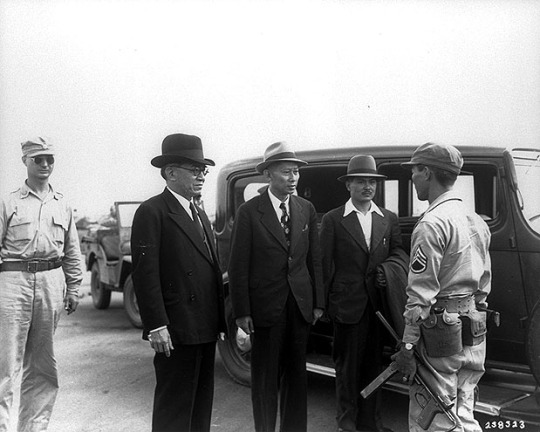
▲ Benigno Aquino Sr. — the grandfather of Philippine President Benigno Aquino III and a collaborator with the Japanese occupation — is taken into custody by U.S. troops in Osaka.
Walden Bello
Foreign Policy in Focus
(September 21, 2015)
In the Philippines, the grandson of a despised collaborator has endorsed the remilitarization of his country's former occupiers — by the grandson of a war criminal, no less.
This commentary is a joint publication of Foreign Policy In Focus and TheNation.com.
This September marks the 70th anniversary of the end of the Second World War. Yet even seven full decades since Japan’s formal surrender on September 2, 1945, fallout over the bitter conflict continues to shape politics the countries that fell under Japanese imperial rule.
The war left its mark not only on the relations between Japan and its neighbors, but also on class politics within these countries. How each country handled its collaborator classes, in turn, has had a considerable impact on how they’ve responded to the current Japanese government’s push to revise the country’s “peace constitution” into irrelevance.
Nowhere is this clearer than in the Philippines, where postwar U.S. authorities helped rehabilitate erstwhile collaborators with the Japanese occupation in the name of fighting communism. Generations later, it’s led to the grandson of a despised Philippine collaborator endorsing the re-militarization of his country’s former occupiers — by the grandson of a war criminal, no less.
History certainly works in mysterious ways.
Horrors of the Occupation
One month before this year’s anniversary, one of my favorite cousins passed away at 100 years of age. During the war, her husband left their house in Manila to serve as a medical doctor in the Filipino-American army, which retreated to the Bataan Peninsula as invading Japanese forces advanced. She never heard from him again.
It was only three years later, after Manila was liberated by General Douglas MacArthur’s troops and Filipino guerrillas, that she learned her husband had been summarily executed, along with three other doctors, while trying to escape from a prisoner-of-war camp. Many of his comrades suffered the same fate upon their surrender to the Japanese. During the weeklong Bataan Death March alone, the Japanese killed 18,000 of their 72,000 Filipino and American prisoners — a mortality rate of 25 percent in just seven days.
My cousin was left with three young children to raise alone, a situation shared by many women during the Japanese occupation.
The Japanese military regime in the Philippines was unrelentingly brutal. Innocent people suspected of aiding the guerrillas were routinely tortured and executed. My uncle was bayoneted and left for dead when he refused a Japanese officer’s order to take down the American flag at his school. My father was beaten with a baseball bat in Fort Santiago, the Spanish-era fortress in Manila that the Japanese converted into a prison and torture center. He was lucky to survive.
Young women and girls, some as young as 11 or 12, were rounded up to serve as sex slaves for Japanese troops. Nobody knows for certain how many Filipinas were forced into sexual slavery, but historians estimate that up to 200,000 women from the Philippines, Korea, China, and other countries occupied by the Japanese suffered this fate. Some 400 of these “comfort women” have surfaced in the Philippines since the 1990s, but this figure is probably only a fraction of those who were actually forced into sexual service. Many others preferred to keep silent.
Overshadowing even the Bataan Death March as a war crime was the indiscriminate killing spree that Japanese naval infantrymen unleashed in Manila as the war drew to a close. Filipino author Joan Orendain has rightfully asserted that the “Rape of Manila” rivaled the better known Rape of Nanking in its brutality, with “100,000 burned, bayoneted, bombed, shelled, and shrapneled dead in the span of 28 days.” Unborn babies “ripped from their mothers’ womb provided sport: thrown up in the air and caught, impaled on bayonet tips.” Rape was rampant, and “after the dirty deed was done, nipples were sliced off, and bodies bayoneted open from the neck down.”
Abe’s “Apology”
With this record of atrocities, one would have expected that Japanese Prime Minister Shinzo Abe’s recent remarks on the war — in which he admitted that Japan had caused “immeasurable damage and suffering” but asserted that “generations to come” must not be “predestined to apologize” — would elicit the same negative reaction in the Philippines that it did in China and Korea.
Abe, the Chinese foreign ministry said in a statement, should have “made a sincere apology to the people of victim countries, and made a clean break with the past of militarist aggression, rather than being evasive on this major issue of principle.” South Korea’s ruling party, for its part, criticized the Abe statement “because it did not directly mention remorse and apology for Japan’s past history of aggression, but only expressed them in a roundabout way in the past tense.”
In both China and South Korea, resentment and suspicion of Japan continue to boil just beneath the surface.
On the contrary, remarks by top Philippine officials were positive. “Japan has acted with compassion and in accordance with international law,” said a presidential spokesperson, “and has more actively and positively engaged with the region and the world after the war.”
Contrasting Trajectories
The different responses stem from the unique political and economic trajectories of the three countries. Three considerations are important:
First, for China and Korea, the anti-Japanese struggle was a central element in the forging of their nationalist identities, or what Benedict Anderson famously termed their “imagined community.”
The Chinese Communist Party has projected itself as the central figure in the victorious “patriotic war” against Japan (though many historians are of the opinion that it was the Communists’ rivals — the Nationalists — that did most of the fighting and dying). Both Korean states see themselves as emerging from the anti-colonial struggle against Japan, which annexed and colonized the peninsula from 1910 to 1945.
For the Philippines, in contrast, the official narrative puts the elite-led revolution against Spain in the late 19th century as its nationalist centerpiece — with the subsequent American annexation of the country painted in largely positive terms and the Second World War depicted as a violent but brief episode on the way to independence.
Second, the three countries have contrasting economic relationships with contemporary Japan. For China and Korea, Japan isn’t just a former military overlord but a contemporary economic rival. Trade and investment relations with the Japanese are seen as a necessary evil to acquire the needed resources and technology to beat them.
In the case of the Philippines, Japan was never seen as an economic competitor but a source of development aid, investment, and jobs. Japan’s image as a wartime enemy was transformed beginning in the late 1960s and early 1970s, when Japanese corporate investments starting producing local jobs in appreciable numbers. Meanwhile, Philippine migrant workers in Japan’s entertainment and sex industries sent back remittances to their families that enabled not only their survival but their social mobility.
Elite Collaboration, Popular Resistance
But perhaps the main factor explaining the different attitudes toward Japan is the class factor.
In Korea, the politics of remembrance was boosted by the destruction of the pre-war landed elite that collaborated with the Japanese — the Korean civil war of 1950-53 and the subsequent land reform all but wiped these elites away. In the Philippines, in contrast, the politics of forgetting was facilitated by a post-war whitewashing of the elite’s role during the occupation.
Once the pillars of U.S. colonial rule, after the Japanese invasion most Philippine elites swiftly switched sides and collaborated with the Japanese. A complex kind of class war ensued, in which the national and local elites worked closely with the Japanese while the masses for the most part hated the invaders and waited for the Americans to return, as promised by MacArthur.
Scores of guerrilla groups formed, the best known and most effective being the communist-led Hukbalahap, which chased away the hated landlords in Central Luzon even as it fought the Japanese. But aside from the “Huks,” there were other, less ideological outfits that were headed by lower-class or middle-class figures — like the charismatic Marcos Villa Agustin, or “Marking,” a former bus driver whose units operated from the Sierra Madre mountain range in Luzon to terrorize not only Japanese soldiers but also local elites.
The end of the war saw impassioned calls from the resistance to try the elite collaborators as traitors. Among the most hated servitors of Japan was Manuel Roxas, the director of the Rice Procurement Agency, who’s described in an authoritative study as having “organized the extraction of rice from peasant farmers to supply the Japanese military” and “was thus the collaborator most clearly identified in the minds of peasants with the betrayal and abuses suffered during the occupation.”
However, the returning General MacArthur intervened to save his pre-war friend Roxas from hanging, an act that anticipated Washington’s rehabilitation of the reviled elite in order to contain the communist-led guerrilla forces.
Laundered and provided international respectability by Washington, Roxas bribed, intimidated, and terrorized his way to victory during the presidential elections of 1946. Shortly before his unexpected death in 1948, Roxas issued the infamous Proclamation No. 51, which granted amnesty to accused collaborators. Reflecting the acute class enmities triggered by the experience of the occupation, one of the reasons cited for the decree was the fact that “the question of collaboration has divided the people of the Philippines since liberation in a manner which threatens the unity of the nation at a time when the public welfare requires that said unity be safeguarded and preserved.”
The first decades of the post-war era were thus marked by a contradiction in the popular mind between the memory of legendary resistance to the Japanese and the reality of continuing domination of national politics by a largely collaborationist elite — one that had been whitewashed by Washington in the name of the anti-communist struggle with the dawning of the Cold War.
So unlike the Chinese and South Korean governments, the Filipino political elite soft-pedaled war damage claims against Japan; extended a warm welcome in the 1950s to Japanese Prime Minister Nobusuke Kishi, a class A war criminal and the grandfather of Shinzo Abe; and did little to help Filipino comfort women in their struggles for an apology and restitution from Tokyo.
Japan Re-Arms
This history informs the Philippine response to Abe’s drive to subvert Article 9 of the Japanese Constitution — the so-called “Peace Clause” that prohibits Japan from engaging in offensive warfare — in order to promote his strategy of “Collective Defense,” which would deploy Japanese troops in offensive operations outside Japan.
China and South Korea have sternly condemned Collective Defense, seeing it as part and parcel of a comprehensive right-wing program to deny Japanese war crimes, refuse restitution to Japan’s sex slaves, bring back old-style Japanese nationalism, and erode the Japanese people’s still dominant pacifism. Philippine President Benigno Aquino III’s reaction, on the other hand, could hardly be more different.
While acknowledging that “there’s been some debate on the Japanese government’s plan to revisit certain interpretations of its constitution,” Aquino asserted during his state visit to Japan in late June 2014 that “nations of good will can only benefit if the Japanese government is empowered to assist others, and is allowed to come to the aid of those in need, especially in the area of collective self-defense.” He added that he did “not view with alarm any proposal to revisit the Japanese constitution.”
This was, at the very least, inappropriate meddling in Japanese domestic politics, one that some analysts say was calculated to influence Japanese public opinion at a time when the majority of Japanese had come out against the country’s remilitarization. A poll released at around the time of the Aquino visit found 56 percent against collective self-defense and only 28 percent in favor. Yet on July 1, 2014, fortified by support from the visiting Aquino, Abe gutted Article 9, resorting to a cabinet decision to skirt parliamentary approval and the requirement for a referendum.
The drastic endorsement of a move opposed by the majority of Japanese as well as Japan’s neighbors is difficult to explain as stemming solely from the Philippine government’s desire to gain an ally in its territorial disputes with China in the West Philippine Sea. Other countries in East and Southeast Asia, even those directly threatened by China’s moves, have been careful not to endorse Tokyo’s new doctrine of power projection beyond Japan — Vietnam being a prime example. Most are worried that the Abe doctrine is intended not so much to assist allies against China’s moves but to support the Japanese leader’s strategic aim of developing a nuclear weapons capability, exercising a more aggressive posture, and rewriting history.
Grandfathers and Grandsons
One element that hasn’t been adequately examined, but which is likely to have played a role in Aquino’s endorsement, is his class memory.
Aquino comes from a class whose experience of the Second World War was very different from that of ordinary Filipinos. Aquino is better known as the son of two icons in the struggle against the Marcos dictatorship, Cory and Ninoy Aquino. But he’s also the grandson of Benigno Simeon Aquino, Sr. — who is chiefly remembered as the Japanese-designated speaker of the National Assembly during the puppet regime, and earlier as the director general of the country’s only political party during the occupation.
Possibly the only reason Aquino Sr. escaped death at the hands of Philippine partisans was that he spent the closing months of the war in Japan. Brought back to the Philippines one year after the cessation of hostilities, he was arraigned on charges of treason at the People’s Court before being released on bail. However, he died before he could take advantage of his friend Manuel Roxas’ general amnesty for local quislings like him.
Did psycho-biographical factors play a role in Aquino’s unquestioning endorsement of Abe’s moves? It’s inconceivable that one whose parents or grandparents suffered under the Japanese occupation would have provided such enthusiastic support for Abe’s quest to project Japanese military power. True, Filipinos have generally become more positive towards Japan, but few would cross the line that Aquino did.
So one is left with the question: Was it more than coincidence that a dangerous new course for the region would be launched by the joining of hands of Aquino, the grandson of a despised collaborator, and Abe, the grandson of a war criminal?
- - - - - - - -
Walden Bello
FPIF columnist Walden Bello is a former representative in the House of Representatives of the Philippines. An earlier version of this column appeared at Telesur English.
#Benigno Aquino Sr#Benigno Aquino III#Benigno Aquino#Kishi#nobusuke kishi#shinzo abe#philippines#japan#politics#anti-communist#fascism#right-wing politics#world war ii#imperialism#semi-colonialism#colonialism#korea#sex trade#comfort women#slavery
0 notes
Text
Every time I read about European politics I keep coming across political parties like “People’s Liberal Democratic Party for Socialist Humanism (political position: fascism, absolute monarchism, neo-semi-hexist currency reform, theocracy)”
311 notes
·
View notes
Text
Round 1


Propaganda Under Cut
Jade Harley
She and Terezi were popularly mischaracterised and villainised in DaveKat fics, especially in Homestuck's heyday. It got really bad when DaveKat became canon.
One of the four original main characters who was progressively sidelined as the comic went on, shipteased with two boys (Dave and Karkat) but did not date either in the main comic. In the semi-canonical epilogue partly written by fans, she was characterized as lonely and hypersexual and 'getting in the way' of Dave and Karkat's true love.
okay so its been a while since my homestuck phase but. basically miss jade is a very kind girl who lives on a jungle island with a magic dog guardian and there are two guys who have crushes on her and treat her really weirdly because of it. anyway the two guys (dave and karkat) go from enemies to friends and are one of the most popular ships in the homestuck fandom despite actually having very little canon interactions while jade ends up lonely and mistreated by the narrative and the fans :(
Jane Crocker
Dynamite gumshoe gal.... I will NOT be talking about homestuck 2 or any of that mess. She loves baking and held so much rage inside of her and I understand. Was hated by large swathes of the fandom for "standing in the way of Dirk/Jake" because she had a crush on Jake.
She had the hots for Jake, but couldn't accurately convey her feelings, and he ended up with another male character (Dirk). Later on she was brainwashed and evil and had him captured and it was heavily implied some awful things would be done but a fair amount of people who ship Dirk and Jake took that as free reign to villainize her entirely for getting in between them when she never really did.
So victimized by the yaoi fangirls people claim Random Fascism in the sequel was in-character
131 notes
·
View notes